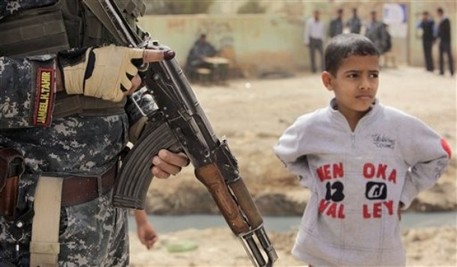
By Kirk H. Sowell
Now that Iraq has made it through another round of parliamentary elections, what next? The Iraqi High Electoral Commission (IHEC) has announced that it will release vote counts in thirds, will all votes to be officially certified by March 18, although such deadlines have been delayed in the past. Originally, the first announcement was set for this Thursday, March 11, but IHEC officials are now saying that they will try to release the first round of results tomorrow. The accelerated schedule no doubt has been influenced by the rampant leaking of partial and sometimes contradictory vote results by Iraqi websites linked to the parties. Credible reports indicate that Prime Minister Nuri al-Maliki has won a plurality, although by how much is not yet clear.
Once IHEC has certified the results, President Jalal Talabani will have 15 days to call the new parliament into session. It then has 30 days to elect parliamentary leaders and a new president. Once the new president is sworn in, he will have 15 days to designate the candidate of the largest bloc as the prime minister-designate, and the PM-designate will have 30 days to form a government. If he cannot, then he may ask for an extension, or the president may designate another bloc leader, and the second bloc chosen does not have to be the largest. For a more detailed explanation of the process, see a recent paper by the Washington Institute for Near East Policy. You may also want to check out IHECâ??s website (although they donâ??t usually keep the English version updated very well).
Bear in mind that the parties which make up the electoral blocs are not required to vote with the leadership of their bloc. While party discipline in the last parliament was pretty strong it was quite common for parties to take positions against the blocs through which they were elected, or leave them entirely. Once the parties are seated, I expect them to realign into five groups which do not necessarily correspond to their blocs.
The first will be Malikiâ??s State of Law Coalition. Malikiâ??s bloc is the most internally cohesive, and it would be surprising of any of the parties running on it were to abandon him.
The second will be the Kurds and the most Iranian-aligned parties of the Iranian-backed Iraqi National Alliance (INA). The success of the opposition Kurdish Gorran Party will likely make them more fragmented than before, but the Kurdsâ?? ties to the INAâ??s leading party, the Islamic Supreme Council of Iraq (ISCI), are longstanding and welded together by a common opposition to Malikiâ??s centralizing drive and the Sunni Arabs and secular Shia who make up the current opposition. While this Kurd-ISCI tandem would like to replace Maliki, I donâ??t expect them to have the seats to do so, and they will probably negotiate a government with him.
The third will be the Sadrist parties of the INA, the Sadr Current led by Muqtada al-Sadr, and the smaller Fadhila Party of the Ayatollah Muhammad al-Yaqubi. They joined ISCI in the INA only to check Maliki, and given their long mutual enmity it would be surprising if they stayed together. Like ISCI, both Sadr and Fadhila have had past conflict with Maliki. The difference between the Sadrists and ISCI is that the Sadrists have made genuine efforts to form coalitions with Sunni Arabs. I know the Sadrists would love to exclude their Shia Islamist rivals from power, but I doubt there will be enough seats for that. They will probably end up negotiating a deal with Maliki.
The fourth group is made up of Sunni Arabs and secular Shia parties, and seem certain to be dominated by Iyad Allawiâ??s Iraqi National Movement. I view recent media coverage of Allawiâ??s success as overblown, however. Allawiâ??s bloc has done well in the Sunni provinces, akin to an American presidential candidate running up votes in a state his party always wins anyway. Credible estimates Iâ??ve seen from multiple sources in the Iraqi press give Allawi only somewhat better results in Shia areas than in the past, which is not enough. They will likely end up in the opposition.
A possible fifth group might form from Sunni Arab and secular Shia groups outside of Allawiâ??s bloc who could end up being a kind of swing vote in parliament. The most prominent is that of Ahmad Abu Risha, whose Anbar-based party played a key role in fighting al-Qaeda during the so-called Surge. This group could also include Sunni and secular Shia elements of the INA which arenâ??t satisfied with whatever deal seals the new government.
Kirk H. Sowell is an independent consultant based in the Washington D.C. area.
(AP Photo)











